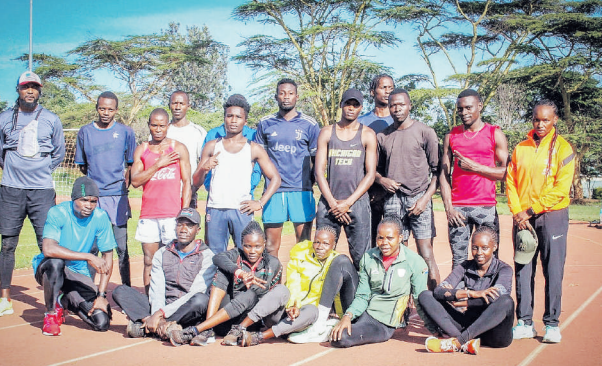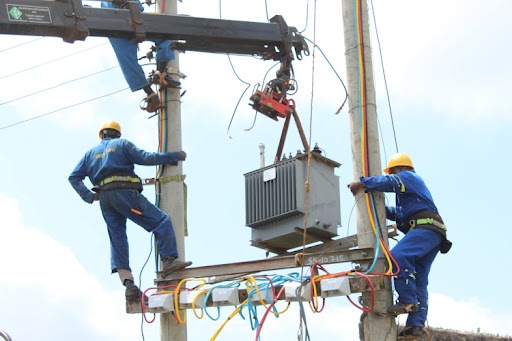

When Ferdinand Omanyala exploded onto the global sprinting scene in 2021, he rewrote history and ignited a sprinting revolution in a nation synonymous with long-distance running.
Kenya’s sprinting landscape changed forever in August 2021 when Omanyala became the first Kenyan to reach the 100m semifinals at the Olympic Games.
His blistering 10.00 seconds run in the semifinals saw him finish behind two global sprint titans—USA’s Fred Kerley (9.96) and Canada’s Andre De Grasse (9.98).
Though he narrowly missed out on a spot in the final, the message was clear: Kenyan sprinting had arrived. Omanyala etched his name in history a month later by obliterating the African 100m record, clocking a stunning 9.77 seconds at the Kip Keino Classic in Nairobi.
This feat not only cemented his status as Africa’s fastest man but also shattered his Kenyan national record, which previously stood at 9.86 seconds.
His success fueled an explosion of interest in sprinting, with young athletes now believing they, too, could compete with the best in the world.
The surge in sprinting talent has been so overwhelming that AK has had to restructure its sprint events to accommodate the growing number of hopefuls.
More heats are now necessary at national trials and weekend meets, a testament to the sport’s growing footprint.
However, talent alone is not enough—proper training, mentorship and infrastructure are crucial. Enter Utawala Stars Sprints Club, a game-changing institution shaping the future of Kenyan sprinting.
Founded in 2018, Utawala Stars Sprints Club has emerged as a powerhouse in Kenyan sprinting, nurturing both budding and professional sprinters.
The club currently boasts 35 athletes, including top-tier names such as: threet i m e Kenya Prisons 100m cham - pion Dan Kiviasi, national 100m champion Meshack Babu, African decathlon silver medallist Edwin Too and 2015 African 100m champion Eunice Kadogo.
At the heart of this initiative is coach Perpetual Mbutu, a former elite athlete whose passion for athletics drove her to establish the club.
“I co-founded Utawala Star Company Limited with a friend, which oversees multiple sports disciplines,” Mbutu explains.
“Given my deep love for athletics, I decided to create a specialised sprint club under its umbrella— Utawala Stars Sprints Club— as a way of giving back to athletics more than any other sport,” she said.
Mbutu’s journey into coaching began while she was still competing, as she experimented with training techniques on younger athletes.
“I learnt to be a coach while I was still an athlete. I started training one young athlete, imparting the knowledge I gained from my coach in training onto him while also trying to find new ways and methods of training and that has now grown to what we have today.”
She acknowledged that Omanyala has been a key source of inspiration for young athletes.
“Omanyala’s heroics on the global scene have inspired so many young athletes to challenge themselves and follow their dreams.”
For Mbutu, coaching is more than just winning races—it’s about transforming lives. “I prefer working with younger athletes because they have untapped potential,” she says.
“My goal is not just to produce sprinters but to change their lives. Many of my athletes come from humble backgrounds, and I offer them accommodation and meals whenever I can. Seeing them earn scholarships and opportunities beyond athletics is my greatest joy.”
Some of the top athletes who have passed under her wings include African triple jump silver medallist Winny Bii, 2022 World U20 400m silver medallist Damaris Mutunga and Uganda’s 200m national record holder and 2024 Olympic athlete Tarsis Orogot who are now currently based in the USA.
“I housed Bii for a year and a half and accompanied her during the 2022 World U20 games in Colombia. She did not do so well but she was scouted and received a scholarship to the US.”
“Mutunga stayed with me for nearly four years as I nurtured her, and Orogot was the second athlete I coached after turning to full-time training. They are also in the US. I am proud of how far they have come,” she adds.
Other key successes under her belt include helping the 2022 Kenyan 100m champion Maximila Imali to lower her personal best over the distance to 11.16.
One of the most promising talents under Mbutu’s wing currently is Dennis Mwai, a 20-year-old sprinter making waves on the local circuit.
“I scouted Mwai while he was still in school,” Mbutu reveals.
“I would send his training programme to his teacher to ensure he sharpened his skills. After finishing school, he was approached by the Omanyala Foundation, but since it wasn’t operational yet, I took him in.”
Mwai has been in red-hot form in 2025, finishing second at the AK weekend meet in Thika on March 1 after clocking 10.2 seconds, behind Boniface Mweresa (10.1s).
He followed it up with another runner-up finish at the Betika BingwaFest Nairobi edition on March 7, clocking 10.3 behind Isaac Omurwa (10.2). For Mbutu, time is the ultimate measure of progress.
“It’s not always about making it to the national team. Any athlete who runs a personal best, I always celebrate with them. I don’t work with positions, I work with time,” she noted.
Training at Utawala Stars is meticulously structured to cater to individual athlete needs.
“At the start of the season, each athlete reviews their previous performances and sets goals for the year ahead,” Mbutu explains.
“We don’t follow a rigid program—we incorporate fartlek training, endurance runs and explosive speed work. However, sprint and reaction drills remain a daily staple at the club.”
Athletes are divided into three groups for specialised training, but full-club sessions are held periodically to build team synergy. With the 2025 World Championships in Tokyo fast approaching, Mbutu is pushing her athletes to hit the qualification marks.
“We have been preparing since the start of the season. The qualification times are a huge challenge, but if the athletes maintain the tempo, we will have one or two athletes from the club representing the country in Tokyo,” she noted.
Despite her successes, Mbutu admits that coaching is not without its pressures.
“When the athletes go to the blocks, I am so tense, and sometimes I may not even watch the race. If there is tight competition, it’s so stressful that I may not even sleep the night before competition,” she says.
Being a female coach in a male-dominated field hasn’t been a challenge for her.
“The athletes listen to me more, and most of them view me as a mother. I have not experienced any disrespect from them.”
“The coaches have also been accommodating, like coach Stephen Mwaniki and national coach Julius Kirwa, whom I consult a lot. AK has also been a huge supporter of us and they are part of the reason for our growth.”
Born in Mwea, Kirinyaga County, Mbutu grew up in a household immersed in sports. Her father was a martial artist, while her mother was a sprinter and physical education teacher.
“I grew up in a household where sports took centre stage. Both of my parents were teachers. My dad was also a martial artist while my mum was a sprinter and PE teacher. In school, I did not have a keen eye for athletics. I used to do all sports,” she noted.
Initially indifferent to athletics, she eventually found her calling after joining the Administration Police (AP) in 2009.
“I broke the AP long jump record and later joined the national training camp in Ngong, where I was identified by KDF coach Andrew Chepkwony,” she recalls.
Under Chepkwony, she transitioned into sprints, dominating the 100m, 200m, long jump and hurdles— clinching the AP title in the events for seven consecutive years.
“I used to win the AP title but sadly I did not fare so well in the national competition.”
During the pre-season, Mbutu would attend AK coaching training completing levels 1 to 3. Mbutu went on maternity leave in 2013, returning to active athletics in 2017 before retiring in 2018 to become a coach.
“My parents were worried after I decided to quit athletics but then they supported me and prayed for me.” She recalls how coach Peter Gatana was instrumental in her transition from an athlete to a coach.
“Most of my time I spent consulting other coaches on what they were doing in order to find ways to incorporate that into my coaching techniques,” she noted.
“We used to run with Gatana but he retired before me and became a coach. He encouraged me to start coaching. From then on I started gaining athletes from the unformed forces like Police, Prisons and KDF and they started trusting me.”
Her first athlete was Ryan Mwakisha, a young protégé in the 100m and 200m before taking in Orogot.
“My first athlete was Mwakisha. By then, he was 16 years old and I decided to nurture him so he can realise his full potential. By then, he was clocking 13 seconds in the 100m, since joining the senior ranks he has been clocking 10 seconds. I am really proud of how far he has come.”
“I trained Orogot for about six months. His coach had trusted me with his training as he was away undertaking a coaching course,” she said.
After that, the uniformed forces started trusting her and giving her some of their athletes to train.
“I met Kiviasi as he was about to go to Poland in 2021. Unfortunately, he was diagnosed with Covid and could not go. He requested me to oversee his training while keeping a safe distance.”
After taking up Kiviasi, Mbutu steered him to clocking a 10.49 personal best in the 100m. Since then, Kiviasi has gone on to lower his best over the 100m to 10.38 during his third-place finish at the 2023 Kenyan trials for the World Championships.
Mbutu then brought in Eunice Kadogo in 2021, Too in 2022 and Babu in 2023 while also bringing in another coach—Simon Rig—to assist her. In 2023, she pursued the IAAF Level One training course before doing the Level Two last year.
Currently Mbutu is in Budapest, Hungary, undertaking an international coaching course. Despite her passion and dedication, Mbutu faces significant challenges in her coaching journey.
One of her biggest hurdles is financial constraints, particularly in supporting young athletes from humble backgrounds. Many promising sprinters struggle to afford basic training necessities, including venue fee and proper gear.
“Sometimes, I identify a talented athlete, but they disappear because their families can’t support them. It’s heartbreaking,” she says.
To counter this, Mbutu personally covers some of the athletes’ training costs and even provides food and accommodation for those in need. However, she acknowledges that sustaining such support is an uphill task.










